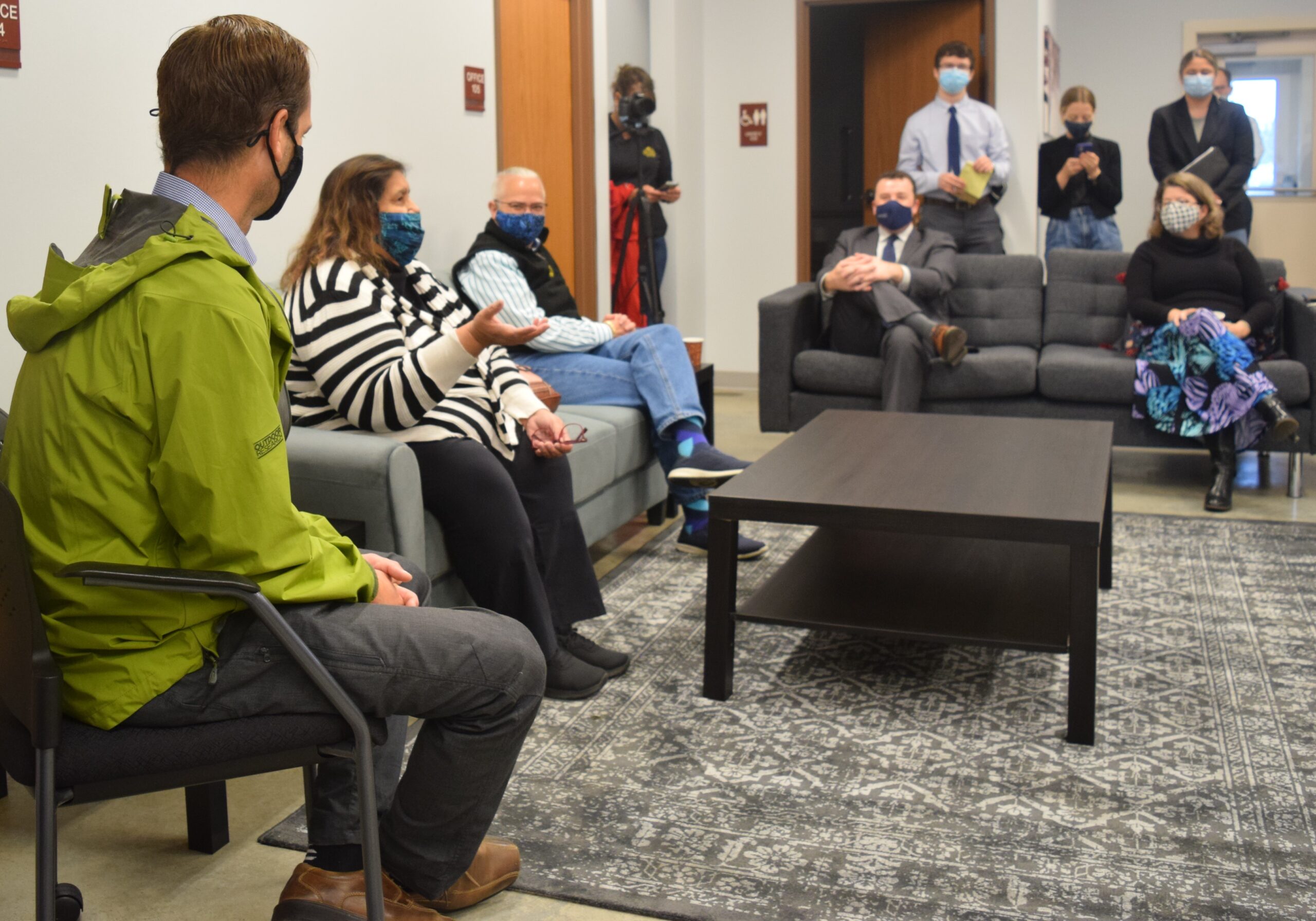ROUNDTABLE HELD ON HOUSING CHALLENGES
Northwest Minnesota Foundation staff participated in a housing-focused roundtable discussion with U.S. Sen. Tina Smith on Friday morning at Conifer Estates, a permanent, supportive housing development on the north end of Bemidji that is now celebrating the completion of its second phase.
“The best ideas, the best innovations come at the local level,” said Sen. Smith, explaining that her job was to listen and support those ideas to help move them forward.

U.S. Sen. Tina Smith makes a point during a roundtable
discussion on housing issues held Friday morning in Bemidji.
Minnesota Housing Commissioner Jennifer Ho also attended the roundtable, listening to local leaders and housing advocates as they detailed current challenges and highlighted the successes of Conifer Estates. Linda McGraw-Adams, who has worked for 26 years with the Red Lake Reservation Housing Authority, recapped how the “lunch bunch” from Red Lake and Leech Lake, and the Bemidji community, met regularly to discuss how to address housing needs for American Indians who lived off the reservation in Beltrami County.
“It takes a ‘lunch bunch’ to do it,” said Commissioner Ho.
The core discussion centered around the “continuum” of housing: options for stable, affordable housing; supportive housing such as Conifer Estates; access to tools such as home-ownership education; availability of financing options; and the eventual goal of home ownership.
“There is a need in every facet,” said Orlando Alamono, the chair of the Beltrami County HRA.
“There is big supply problem all across the continuum,” Sen. Smith agreed.

Nate Dorr, left, vice president for advocacy at NMF, listens as Linda McGraw-Adams,
with the Red Lake Reservation Housing Authority, speaks to the history of
Conifer Estates, a permanent, supportive housing development in Bemidji.
Emilie Rivera, a member of the Bemidji City Council, shared that Bemidji’s rental properties are now over 50 percent of the city’s housing stock. As a single-parent who utilized Section 8 for housing, Rivera said developments such as Conifer are important in providing a safe place for families.
“This gives people a chance,” she said. “These projects are a dream come true for me.”
Nate Dorr, vice president for advocacy with the Northwest Minnesota Foundation (NMF), shared that the Foundation provided housing planning grants in ramping up toward the first phase of Conifer Estates, completed in 2012.
“We still need more units,” Dorr said.
Sen. Smith sought opinions on how best to allocate what is expected to be around $340 billion over the next 10 years to enhancing housing, specifically supportive housing, throughout the United States. Priorities currently center on the need to maintain existing housing stock, expand more supportive housing availabilities, and implement strategies to enhance home ownership options.
Ryan Zemek, the new executive director of the Headwaters Regional Development Commission, highlighted the importance in planning support for such projects. Minnesota Housing, he said, is great at providing construction costs, but the planning funds, such as those from NMF, are also greatly appreciated.
“Projects like this – any kind of project – take partnerships,” Zemek said.

Minnesota Housing Commissioner Jennifer Ho speaks during
a roundtable discussion held Friday morning in Bemidji.
All units of governments – from the local to the state to the tribal to the federal level – must work together, he said, toward affordable housing solutions.
Others agreed, but as someone suggested that the “system must work,” Ho jumped in to clarify that the difficulties exist because housing is not a system, but rather a market.
“If it was a system, it would take care of everyone’s needs,” Ho said.
NMF’s place, Dorr explained, is to step forward and get involved when there is a market problem or failure.
The benefit of being in a “high-needs community” such as Bemidji, said Reed Olson, a Beltrami County commissioner who also serves as the executive director of the Nameless Coalition for the Homeless, is that “organizations are forced to collaborate with each other.”
NMF hosts meetings for service providers every Friday, Olson said, in part to be sure that efforts are not overlapping or duplicative.
“We’re always looking at ways to partner, to be more efficient,” he said.

Reed Olson, a Beltrami County commissioner and executive director of
the Nameless Coalition for the Homeless, speaks to Sen. Tina Smith.
For more information on NMF’s Housing program, please visit www.nwmf.org/programs/housing/
or email Cory Boushee, Program Officer, at coryb@nwmf.org





